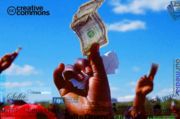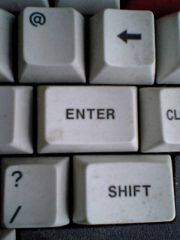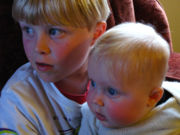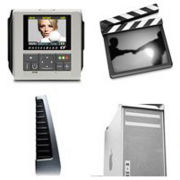ANZAAE2009 digital literacy
This page was used as a discussion board as part of the Aotearoa New Zealand Association of Art Educators Conference 2009, hosted by Otago Polytechnic Art & Design with Kai Tahu ki Arai-Te-Uru.
Full details and event information about the conference can be found here.
Otago Polytechnic There are many staff, schools and developments in online resources across the polytechnic, most of which are collected here.
In particular this page is being used before during and after a Digital Literacy Roundtable facilitated by Dr. Susan Ballard and Rachel Gillies on Wednesday 22nd April at 2pm in the conference.
Learning Arts in the Digital Age: Identifying Principles and Developing Online Resources (60 minute facilitated roundtable discussion):
Considering the ethical and other implications of teaching and learning art in a digital age and exploring the development of online resources for learning and teaching.
Contents
Introduction
School of Art Digital Literacy
The Electronic Arts Section, run by Academic Leader Dr. Susan Ballard at the School of Art, Otago Polytechnic has been running a Digital Literacy course online for the past two years. In 2007 Rachel Gillies led the development of this core Digital Literacy paper that now runs in the first year of the Bachelor of Visual Arts (BVA). In it, students are introduced to a wide range of digital devices (hardware) and programmes (software) as well as problem solving techniques related to their uses. Through the digital literacy paper students gain an understanding of relevant digital skills in relation to their study and art practice. The overall aim is to ensure that all students gain a fundamental confidence in the use of a variety of digital tools, and an over-arching understanding of their wider application within both artistic and digital contexts.
Through the research and development of this paper, and the associated technologies and theories Su Ballard and Rachel Gillies have developed a wider understanding of the role that digital media and online resources can play in learning and teaching, specifically in the context of art education.
Shifts
Central to our work is the notion of "situated media" - that is - digital media understood within the cultural practical and technical experience that is an art school.
"Today’s graduates are entering a remarkably different professional context than even those of twenty years ago.
The new pedagogical problem is how to create students who can be successful producers of media for the rest of their lives. Education for this changing professional environment can no longer just be theoretical—or even a combination of theory and practice. It requires critical and collaborative practitioners, and the reshaping of the undergraduate curriculum with their future in mind."
Danny Butt
Learning & Teaching
Students
"Gaining the ability to act as collaborative co-creators in flexible roles"
Axel Bruns QUT, Australia
- using the tools to teach and then to understand the other media
- weekly tasks - key - give them a bit of paper.
An education strategy to encourage critical contexts and depth of criticality in students writing blogs, devised by Dr Stephen Naylor and discussed during the ANZAAE2009 conference: "every post must end with a question".
"students love youtube" youtube analysed by way of moodle, being very specific with the questioning and the strategies for controlling the kinds of conversations. merging of the two groups and assumptions about digital natives, and they need technical support because of the teaching/ classroom context
- Is it different across tertiary, secondary and primary teaching?
- where are the resources?
Technology
- Web2.0 – blogs, podcasts, wikis & social networking…
- Learning Management Systems (LMS)
- Will they save/change/define us?
- Teaching and/or learning
“The bit of wikipedia that I wrote is correct.”
Professor Peter Murray-Rust
- User-generated content is not necessarily expert-free
- Teacher-led versus user defined teaching environments
Not just about the tools:
- Creative
understanding the issues of public and private. uses of youtube. "this is a public document"
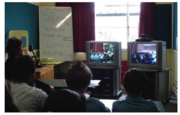
- Collaborative
blogging social technologies being used to pool their resources facebook or myspace why not use these - wikieducator seems to be our (the teacher's) space how understand issues of copying and intellectual property? - introduce students to the in's and out's of creative commons.
- Critical
where they find it useful
- Communicative
quick text messages, blogs, working with each other
blogging at 4am? issues of immediacy
The Art Classroom
Context
- Art Education
- "Digital natives"
teaching linear style and how we adapt to the changes we all experience as we learn
melding the two corpii of knowledge
rejection of the terms digital 'natives' and 'immigrants' as highly colonial, and an unclear generalisation.
Reading List
- Bruns, Axel. "The Future Is User-Led: The Path Towards Widespread Produsage." Paper presented at PerthDAC 2007: The 7th International Digital Arts and Culture Conference "The Future of Digital Media Culture", Perth, Australia, 15 - 18 September 2007.
- Bridge, Jean. "Interactive Learning for Interactive Media: A Serious Game for Educators." Paper presented at PerthDAC 2007: The 7th International Digital Arts and Culture Conference "The Future of Digital Media Culture", Perth, Australia, 15 - 18 September 2007.
- Butt, Danny. "Designing Graduates: Reshaping Undergraduate Study in New Media." Waikato Institute of Technology & Macquarie University Online Link
- Smith, Vicki and Adam Hyde. "Centres and Peripheries." In The Aotearoa Digital Arts Reader, edited by Stella Brennan and Su Ballard. Clouds and ADA: Auckland, 2008. p57-61.
- Prensky, M. (2001). Digital natives, digital immigrants. On the Horizon, 9(5), 1–2. Available to download here
Further Info
Susan Ballard E-mail
Rachel Gillies E-mail
Aotearoa Digital Arts Website
Rachel Gillies Online
External Links
The Phrase "Digital Native" as coined by Mark Prensky-Wikipedia
Danny Butt's Website: Danny Butt is a consultant, writer and educator on culture and technology, based in Aotearoa New Zealand.
Siggraph Education Committee knowledge base which aims to provide a standard structure for any institution that is enhancing or creating a Digital Art programme.
Peter Murray-Rust on wikipedia
Digital Foundations by xtine burrough & Michael Mandiberg
FLOSS Manuals, Adam Hyde's free manuals for free software, including Digital Foundations
